Top 25+ Basic Life Skills That Every Child Must Learn Before Going to School
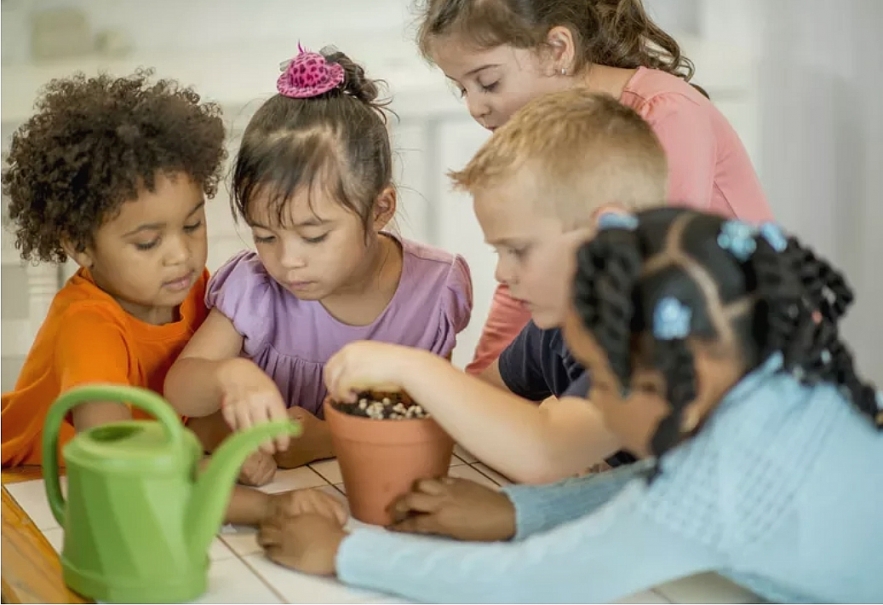 |
| Teaching Life Skills out of the Classroom |
Life skill education simply cannot stop with the exposure your child receives in school. To learn its importance, a child needs to be taught at home through experiences and training activities.
As parents, a lot of our focus tends to be on academics – getting kids through school successfully with good grades. But helping kids learn basic life skills – from doing laundry to managing money to standing up for oneself – can be equally important to our children’s success.
Kinds of Life Skills for Kids
The three major life skills areas are daily living, personal and social skills, and occupational skills. Daily living skills range from cooking and cleaning to managing a personal budget.
They are the skills necessary for supporting a family and running a household. Personal and social skills help nurture the relationships that students will have outside of school: in the workplace, in the community, and the relationships they will have with themselves. Occupational skills, as discussed, are focused on finding and keeping employment.
Children entering class for the first time - standing in front of a new door of life, children cannot help but be surprised, so parents need to equip their children with necessary skills to help them stand firm in all situations.
Entering 1st grade at school, children will enter a new turning point in life, away from parents' arms, more independent in life. However, at school, children are still too young, do not have much experience and life skills.
Therefore, before sending their children to school, parents need to equip the following compulsory skills:
Top 25+ Essential Skills Every Child Must Learn Before Leaving Home
Let’s also look at how you can teach your child these skills. With these skills, the baby will no longer be surprised and can be more confident, grasp the knowledge and control his behavior, helping his learning and training take place better.
Read More: How to teach your kids basic math skills
1. Learn self-discipline
Here are simple methods that can help children build self-discipline:
Take a sheet of A4 size paper and fold it in half lengthwise. Make small cuts on the bottom half.
- Put stickers on the upper and lower parts.
- Write a task in each ''window'' like ''make bed'', ''brush teeth'', ''exercise'' etc. Add some pictures illustrating these tasks.
- Draw a green check mark on the back of the paper to indicate that the task has been completed.
You can stick this to-do list on the wall in your child's room to remind them of their daily tasks in the morning and help them stick to the schedule.
Basic self-defenceDeveloping self-defence not only makes the child feel more independent, but also more confident. Basic self-defence is a must — be it for your son or daughter. Most schools these days invest in teaching basic self-defence to children. But if your child’s school does not, don’t hesitate to send them for classes outside. |
2.Do your own personal Hygiene
Basic habits that parents should teach their children include: going to the toilet by themselves, brushing teeth, washing face, washing hands and feet, drinking water...
Learning these things, children will be independent and neither will parents. have to worry when the child is in a new environment. A timetable also keeps your child excited.
Read More: Best wishes and quotes for kids on first day at school
3.Cleaning and other Household Chores
Getting kids to get involved in cleaning activities is really hard! We agree. But we assure you that your effort will be well worth it!
Start small by just asking them to keep their room clean, make their bed, and make sure everything they own is in its right place. You can then ask them to clean the dishes that they use to eat after eating as well.
You can ask them to dust the tables one day and ask them to take the trash out on another; you can also ask them to set the table in whichever way they think looks the best and ask them to get creative with it
Ask them to participate in chores such as these to help you out or in exchange for their allowance.
It’s important to practise these activities both in the context of an allowance and out of it, so your child learns to just help out without being given anything in return, too.
Working for parentsParents should have a specific timetable and assign their children to do simple chores around the house. For example, cleaning toys, arranging clothes in the closet, arranging dishes, taking out the trash... Participating in housework not only helps children mentally and consciously, but also helps parents connect with their children. in family affairs. |
4.Self-Care Skills
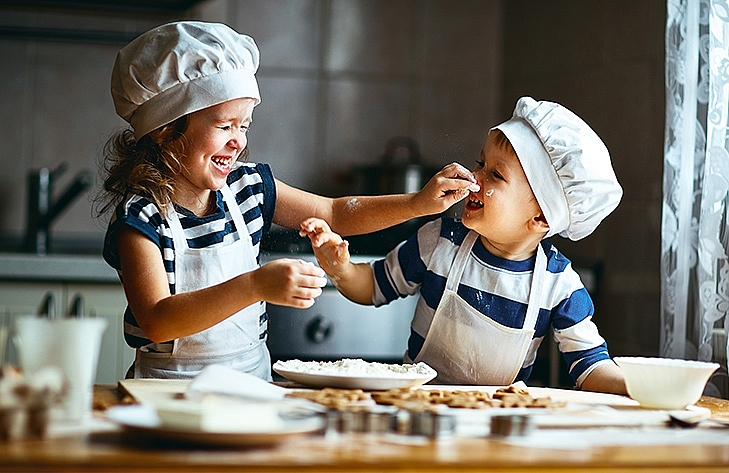 |
| Top Life Skills For Your Kids |
When entering school, it means that the child will have to go to new life, so the basic jobs he/she can do for himself/herself are dressing, hat, socks, and shoes. Therefore, parents need to train their children to be able to do it by themselves quickly so that there are cases where the children are not able to do it on their own.
Hold the scissors properly
Children often forget how to hold scissors correctly. To help your child remember how to put their hands and avoid hurting them, draw a smiley face on their thumb and explain that smileys should always smile back at them.
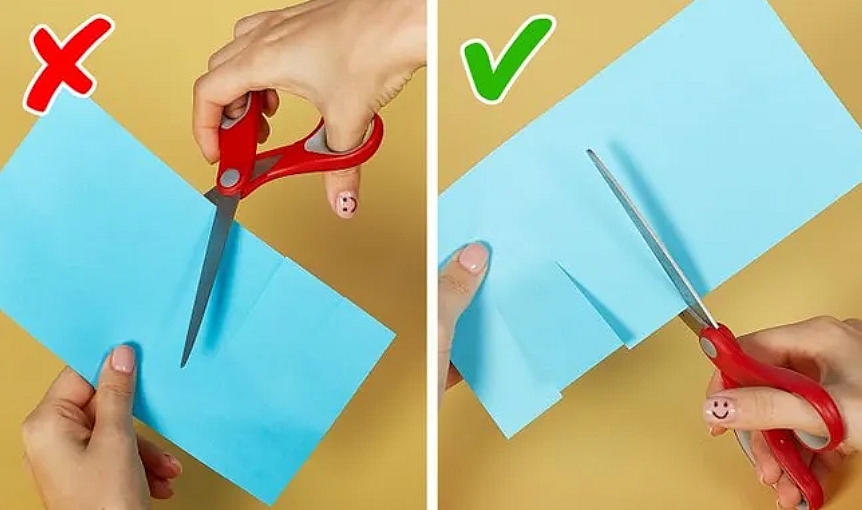 |
| Hold the scissors properly |
Learn how to tie shoelaces
Teaching children how to tie shoelaces is not easy. However, you can use a piece of cardboard to do this. Draw a shape of a shoe, make small holes and tie it with an elastic band. Children will find it much easier to do it this way.
Learn how to dress
This is one of the basic skills that children should learn. Dressing yourself after bathing will help your children form independent habits and know how to take better care of themselves.
Learn how to open and close buttons
You can make this fun toy to teach your child how to button and unbutton clothes. Cut a worm out of colored paper, sew buttons on it and glue pieces of soft yarn with small cuts on it.
Wash your clothes
 |
| Kid Learn How to Do Laundry |
Involve them in household chores such as doing the laundry. You can teach them how to turn on the washing machine, what kind of clothes to wash separately, how much detergent to use, how to turn on the dryer, etc.
| Learn How to Do Laundry and Iron It might sound boring but teaching your kids to do their own laundry can provide them with a different sense of independence while taking some chores off your own workload. If they are old enough to use an iron, you can also teach them how to properly care for their nicer clothes too. |
Learn How to Repair Clothes
Learning how to sew at a very basic level can be incredibly rewarding. Teach your kids how to sew on a button or fix a small tear. It works their fine motor skills and teaches them to repair items instead of throwing them out. You never know, maybe your child will fall in love with sewing and design!
5.Learn to Tell Time
This simple but ingenious trick will help you teach your child to tell time.
- Take 2 paper plates. Write the numbers representing the minutes (0, 5, 10, 15, etc.) on the first number. Then, write the numbers 1 to 12 and make small cuts on the other sheet. Place the first plate under the second.
- Use a pin and 2 arrows on the paper with the words ''hour'' and ''minute'' to join the panels together.
- Change the position of the arrows and ask a child to read the time on the clock.
Now you can easily demonstrate the connection between minutes and hours. Simply bend the top of the watch to show the "hidden" minutes below the hour.
6.Manage Time
Let’s face it, there are many adults who could still learn a thing or two about time management. But the more kids understand this life skill before living on their own, the more successful they’ll be.
Managing one’s time is a skill kids need to learn in order to successfully manage a busy college schedule or assign priority to a variety of work projects.
It might be tempting to simply dictate when kids should do which activities and in what order. But kids will learn best if they’re able to practice time management independently.
You’re probably wondering how. Well, you can do this by getting your kid to claim responsibility for their own time.
Do this by getting them an alarm clock that they can use to wake up on time for school, instead of you waking them up.
Get them a planner to use to track their school work and other extra-curricular work and to keep track of what needs to be done by when.
When they do this, they will automatically begin to allow specific amounts of time for play and for work.
Why Are Life Skills Important?The key element in most of these curricula is a transition, preparing students to eventually become responsible young adults. For the special ed student, transition goals may be more modest, but these students also benefit from a life skills curriculum—perhaps even more so than typical learners. 70-80% of disabled adults are unemployed after graduating from high school when with a head start, many can join the mainstream of society. |
7.Learn to Count
This is also a necessary skill for children when entering grade 1, this skill you can guide your child every day, even while playing with questions, how many people are there in your house, or picking up 5 tomatoes. for Mom. These ways will help children have better thinking and memory.
Parents see How to teach 5-year-old children to learn Math to be able to teach Math effectively, prepare knowledge for children before entering 1st grade.
A child can learn basic math with colorful Lego blocks. Make a paper card and write the number on it. On each card draw a multicolored tower with the block number corresponding to the number on the card. This will help your child learn faster.
8.How to Interact or Talk with Strangers
Out in the world on their own, our kids will encounter many strangers – professors, coaches, advisors, landlords, store clerks, managers, and co-workers just to name a few.
We’ve all taught children about stranger danger but this doesn’t make much logical sense considering every person we’re close to as adults was a stranger to us at some point.
Instead, teach your children to do exactly what adults do. Teach them to differentiate between good strangers and bad strangers. Teach them how to interact with good strangers.
Our adult kids need to know how to look these people in the eyes, clearly communicate with them, and possibly even advocate for themselves if need be. But if kids have never been encouraged to speak to strangers on their own – if their parents have always spoken for them – kids’ communication skills will be stilted which could, among other things, come across poorly in a job interview.
And that advice parents give to kids about “not talking to strangers”? Stats show it’s more likely your TV set will fall on your child’s head than a stranger will abduct them. Try a different approach that lets kids know that not all strangers are bad. For example, one Mom told her kids that if they ever get lost to look for another mom with kids – she’ll be most likely willing to help.
 50 Fun Things To Do With Kids When They Are Bored At Home 50 Fun Things To Do With Kids When They Are Bored At Home What should we do when our kids say “I’m bored” but they can’t go out during the pandemic. |
9.Take Care of Their Health
Another important skill is teaching your child to take care of their health. Instead of forcing your child to eat vegetables, talk to them about health risks in eating junk food all the time and explain how the healthy food will benefit them in a way that they can apply to themselves.
Eg: For a kid interested in sports, talk about foods that give them increased stamina and agility, enabling them to play better at their sport.
10.Recognizing Unhealthy Foods
This feature helps children to be more conscious in eating and protecting their own health. Children can recognize which foods are harmful to health and how unhealthy snacks should be avoided.
In addition, there are many other common skills that parents need to pay attention to to be able to apply easily to their children as well as learn more good experiences when their children are about to enter grade 1 to be able have more knowledge and prepare well for your baby. All these skills as well as basic knowledge are updated and summarized in detail on Taimienphi.vn, let's find out the details and apply them in the most reasonable way for your babies.
11.Make Them Do Their Own Work
 |
| Helping kids learn basic life skills – from doing laundry, cooking to managing money to standing up for oneself – can be equally important to our children’s success. |
Let’s face it. When our kids grow up, they are very likely to leave home to pursue their education or career. And if they aren’t taught responsibility and daily-living skills today, it would be a problem for them in the future.
Most parents run around doing everything for their children so much so that the child doesn’t get involved in anything. This shouldn’t be the case.
Be it putting their school bag together or taking the plate to the kitchen, ensure your child is ‘responsible’ for their work. Teach these skills now, before it’s too late! And there will be another helping hand at home, isn’t it?
You can also try an activity box like Flintobox to make a child learn and develop skills independently. The activities in Flintobox are highly educational where children learn concepts and life skills through play!
Learn Simple Cooking
Teach your child how to make their own peanut butter and jam sandwiches, teach them how to butter a slice of bread, and how to make a salad.
Have them tear up greens, squeeze lemons, and put chopped vegetables together to make a salad.
You can also get them to help you with baking, with handing you ingredients while you cook or with keeping the kitchen table clean while you’re preparing a meal.
Usually, there isn’t enough time in the day to have your kids help with dinner. Between work and their afterschool activities, teaching your kids to cook can seem like a low priority. However, having them learn to feed themselves is a super useful skill for when they are older – and maybe even being able to help out with dinner when everything returns to normal.
Choose five basic recipes together and help them through the process. Having five “go-to” meals will definitely come in handy.
12.Decision-Making Skills
Education, career, life partners — there are so many important decisions we need to make in our lives. How about instilling the skill of making appropriate decisions at an early age itself in your child?
Here’s how to — teach them in small and simple ways how to make wise decisions. Start by asking them to choose between 2 activities or games; 2 different types of clothes; 2 different food items, etc.
Once this happens, the child will understand the consequences that each decision causes. So guide your child through the process, help them weigh the advantages and disadvantages before they make their decision!
13.Saving, Managing Money or Spend Money Wisely
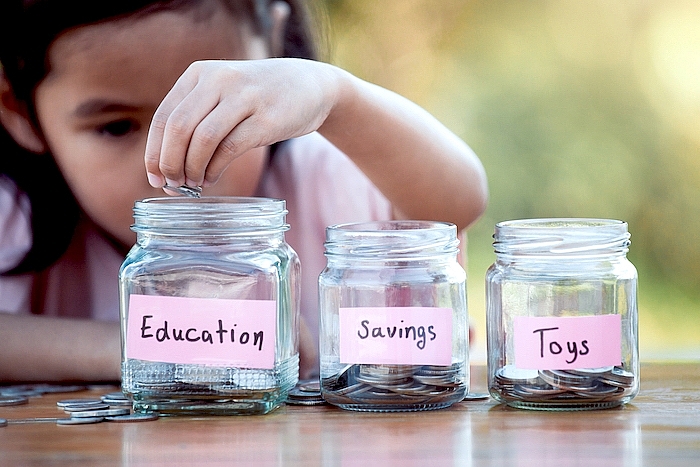 |
| Kid Learn to Saving Money |
This is one of the essential skills to develop. Give your children a certain amount of pocket money every week or every two weeks that they have to use for their expenses.
If they wish to buy something a little more expensive, ask them to save up their pocket money to buy it.
Or, you can lend them a helping hand by telling them that for every chunk of money they save, you’ll add a certain amount of money to their fund for buying the product.
This will motivate them more. I think the concept of comparative shopping also comes under the concept of teaching your child about budgeting.
Tell them why you choose comparatively cheaper options sometimes. When they want to buy a few things when you go shopping, encourage them to pick one or two items if they’re of the same kind.
This kind of budgeting training develops a habit in your child to not waste money and to respect its value.
They are introduced to the concept of money from the age of 7 in school via subjects like Maths but nobody teaches them the importance and relevance of budgeting, planning, saving and the real value of money as they have never handled money in real life.
Open a bank account for your child, ask them to deposit some money every month (money received as gifts or if they help out in the house with some tasks you could pay them a small amount.) This will inculcate the habit of saving and appreciating money.” Wouldn’t you agree?
Shopping seems easy enough – go into a store, purchase what you need and leave.
But to spend money wisely, one needs to understand the importance of delayed gratification, saving towards a goal, determining what a good price is for an item, and why it may not make sense to purchase something just because it’s on sale.
Kids can learn these hidden variables in the shopping experience if they are able to manage some money on their own. Some parents may do this with a weekly allowance, while others might choose an allowance for only certain expenditures like clothing.
Give them an allowanceGive your kids an allowance starting around age six. When your child wants something, ask if he or she has enough money to pay for it on their own. |
14.Importance of environmental preservation
Instilling the importance of environment and sustainability at an early age will teach your child to be more loving towards the planet. Teach your kid why preserving the environment is essential by making small lifestyle changes at home. Get them to practise eco-friendly habits in everything they do.
You can also make them do environmental activities such as gardening and collecting waste to throw in a bin. If you have a yard, give them a portion of the yard to plant whatever they like in.
Help them sow seeds and make it their responsibility to water the plants. If you don’t have a yard, you can always use planting pots.
15.Resilience & Adaptability
Another important skill would be to teach your child to be resilient. How you can do this is by ensuring you don’t feed your child with solutions all the time.
Empower your child to problem-solve by themselves so that they’re ready to face challenges as and when they come. They must learn resilience to adapt to different changes and different environments.
Make sure you have an open channel of communication to understand what your child is going through and help them out — and of course, as a parent, you too must model resilient behaviour at home!
16.Complete the Work
You should also make requests for your baby and expect him to do the best, through which you can create a habit for him such as finishing homework before going to bed as well as cleaning up toys after playing.
These jobs become habits, giving the child the best lifestyle.
17.How to Use Maps and Take Public Transportation on Their Own
Not every kid lives in a city, but whenever possible it’s helpful to teach kids how to navigate public transportation on their own. This can be accomplished by getting kids involved when navigating a map. Or having them help figure out which path to follow to get on the right train.
Or you could do as the Japanese do and let your kids go on errands as young as 2 or 3.
Going somewhere? Start off by teaching your kids the routes around your house and test this by asking them to direct you home or to school the next time you’re dropping them.
You can then ensure that your child learns how to read a map, and also teach them how to use a GPS and follow its instructions.
Going somewhere? Start off by teaching your kids the routes around your house and test this by asking them to direct you home or to school the next time you’re dropping them.
You can then ensure that your child learns how to read a map, and also teach them how to use a GPS and follow its instructions.
18.Using a Computer
It's not just about letting children watch movies or their favorite channels, how parents should also let their children get acquainted with the device, the shortcuts, open or how to use it properly.
Most children will adapt very quickly and will not be confused and unfamiliar when they have to interact with computers later.
19.Memorize the Alphabet
Grasping the alphabet when entering grade 1 is something that parents need to practice for their children, currently on the market there are quite a few toys for children that work to help children learn in many ways. France. The form of learning through play, playing and learning applied to children at this age is also quite reasonable, so train your baby to memorize the alphabet and recognize the best letters.
20.Know How to Write My Name
Being able to read and write fluently are two relatively difficult skills, so when you are familiar with the alphabet, you should practice with your child both how to write and the first thing is to write your baby's name, it will be interesting for children. children as well as helping them to write their own names easily and fluently.
21.Belonging to Many Songs
 |
| Life Skills Your Kids Won't Learn in School |
At a young age, children have been sent to childcare as well as attending preschool classes as well as can learn melodies and languages through songs, so if they remember and sing songs, their skills will improve. Your baby's language will be perfected and developed better. Along with that, teaching children to sing as well as memorizing songs can make them more confident when raising their voices, combined with song explanations to help them understand more about the lyrics as well as phenomena in daily life. day.
22.Find your baby a close friend (group)
For babies, having a friend to talk to every day is also important. Playing with peers not only helps children to balance psychologically and relax mentally, but through friends, parents can also know the troubles the baby is facing to intervene in time.
23.Know How to Compose Stories
Make it a habit to tell your baby a bedtime story every day. Next, you can suggest to your child how to build stories according to his or her imagination. You should only give your child a few samples of characters and details and let him complete the story in his own way.
24.Remember home phone numbers
When children enter 1st grade, you need to teach them to remember the phone numbers of their parents. Show your child how to make a real phone call.
25.Teach children how to share with others
This is a relatively necessary skill to create compassion for children as well as empathy and sharing with friends and people around. If the child is too pampered and selfish, it will be difficult for the child to adjust to his friends and not be able to absorb the best schoolwork.
26.Learn to Swim/Water Safety
Most parents know that learning how to swim is an essential life skill for kids to keeping them safe – especially if they spend any time around water or pools.
But beyond this practical reason, swimming is also a beneficial low-impact sport that can be done throughout one’s lifetime.
Kids can begin to learn how to swim as early as 18 months when, at that point, the idea is to get them comfortable with the water. The easiest way to teach kids to swim is through lessons.
27.Let Them Make Mistakes
Allow your young kids to make financial mistakes while the stakes are still low. For instance, if your child spends all of their money on a toy when they'll be going to the carnival later, do not give them more money to spend at the carnival. Let your child recognize that once money is spent, it's gone.
28. How to Fail
Failure is an important component of success, since no one achieves their goals without experiencing setbacks. Unfortunately, schools are set up so that failure is seen as a terrible outcome, and the way that failure is talked about in our society can make kids (and adults) believe that they need to avoid failure at all costs. This leads to kids and adults who give up when they feel frustrated and are afraid to take risks.
Conclusion - Top Life Skills That Kids Won't Learn in School
Functional life skills are skills that we acquire in order to live a better, more fulfilling life.
By the time a child is five to seven, they’ve developed the foundation of their personality and this kind of life skill development really enhances positive personality traits.
At this age point, your child should be fairly independent in the way they function inside the house. They should also be following any safety rules that you lay down for them, which goes to show the personality trait of understanding and reasoning.
Your kids need you to teach them the above life skills so that they are not caught by surprise once they reach adulthood — and you are never stuck laundering the clothes of a capable young adult.
Preparing your child for adulthood is no easy feat. But recognizing which skills your child will need can help you figure out the best way to introduce those skills.
 How To Draw A Nose For Kids & Beginners With Simple Steps How To Draw A Nose For Kids & Beginners With Simple Steps The nose is one of the most important parts of the human body, and it is not easy to perfectly capture the drawing of the ... |
 50 Fun Things To Do With Kids When They Are Bored At Home 50 Fun Things To Do With Kids When They Are Bored At Home What should we do when our kids say “I’m bored” but they can’t go out during the pandemic. |
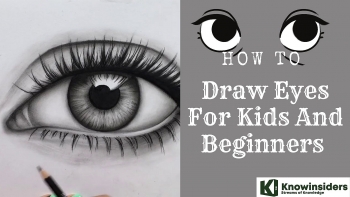 How To Draw Eyes For Kids & Beginners with Simple Steps How To Draw Eyes For Kids & Beginners with Simple Steps Drawing eyes is not easy for most beginners and kids, and if you are looking for a step-by-step guide, you have come to the right ... |
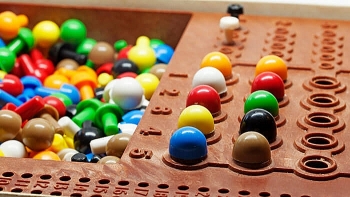 7 Best Educational Games for 7 Year-Old Kids 7 Best Educational Games for 7 Year-Old Kids When it comes to finding great apps for kids 7-year-olds, you must look for apps that they will actually spark their interest and keep them ... |























